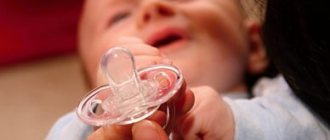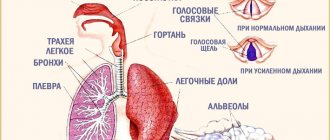When a baby appears in a warm crib, it is a great happiness for the family and in particular for the mother. But after such an event, especially young parents become much more anxious than before. Mothers constantly listen to their baby, they are interested in every breath and sound, every, even the slightest, movement.
It happens that the child groans. No one immediately says that this is bad and unsafe. But the mother is already nervous and thinks that the baby is sick. Let's talk further about why children groan, how safe it is, and in what cases you should run to the doctor.
Why does a newborn cry after breastfeeding?
The most common reason why a baby cries after feeding is colic. They represent pain in the intestines caused by increased gas formation. The main sign of colic is a sharp, high-pitched cry from the baby. At the same time, the newborn begins to blush, arch over, twist his legs, clench his hands into fists, close his eyes and hold his breath.
Colic usually appears in the afternoon, towards evening. Their average duration is 3 hours. At other times, the baby feels well, he gains weight and has a good appetite.
The nature of the appearance of colic has not been precisely studied by doctors. Painful sensations in children appear unexpectedly and disappear abruptly. Many children suffer from colic from the month of life until they reach 3 or even 6 months. Some babies do not develop colic.
There are no universal remedies for getting rid of infant colic. But there are several ways to alleviate the child’s condition:
- Shifting or carrying the baby in your arms, tummy down. This pose helps eliminate excess gases.
- Massage the tummy clockwise.
- A heating pad or warm diaper on the tummy.
Dill water helps many children with colic. Nursing mothers are recommended to drink fennel teas.
Among the medications, drugs based on simethicone help - Espumisan, Infacol, Kolikid, Bobotik, Sab simplex. They must be taken with caution. Although they are approved for small children, they contain flavorings and can cause an allergic reaction.
As a last resort, you can use a gas tube or an enema. The main thing is not to harm the baby: the gas outlet tube can injure the anus, and the enema washes out the natural microflora, which can lead to intestinal dysbiosis and the inability to defecate on its own.
Swallowing air during feeding can lead to colic. This happens if the baby is not applied to the breast correctly. When feeding, the baby should not be distracted by extraneous things. At this time, it is better to turn off the TV and remove bright objects away. In order for air to escape from the stomach, you need to hold it in an upright position for 15 minutes after feeding.
Increased gas formation can be caused by foods high in sugar that a nursing woman eats. She should go on a diet.
The cause of colic can be lactase deficiency. The breast milk that the baby receives at the beginning of feeding is called “foremilk.” It is rich in lactose (milk sugar). After about 10 minutes, the so-called “hind” milk begins to be produced, rich in fats that neutralize lactose and reduce gas formation. If a newborn receives only foremilk, then he or she develops an excess of lactose and a lack of lactase, which leads to bloating and flatulence.
Sometimes crying causes a feeling of hunger if the mother does not have enough milk due to problems with lactation. To check whether the baby is getting enough food, you need to weigh him before and after feeding. The result obtained is checked against the food consumption standards of children of the corresponding age. You can also determine malnutrition by the number of wet diapers (there should be at least 6 of them per day). If the newborn really does not get enough to eat, you need to supplement him with formula.
Too much milk pressure can cause fear for the newborn. If he doesn't have time to swallow, he gags, squirms, screams and refuses the breast. In this case, it is worth reassuring the child, perhaps expressing excess milk and continuing feeding.
Newborn baby strains and groans
If your baby is pushing, he is one of the vast majority of normal babies. Children in the first few weeks and months are characterized by this behavior, and it does not portend any disorders, deviations or health problems.
Doctors cannot name the exact reason why a newborn is pushing; more precisely, there may actually be several reasons, and there are also just versions. But if the baby doesn’t express other signs of anxiety, then don’t let the child’s straining scare you. Moreover, it is very often accompanied by grunting or groaning, which can also be an absolute norm. Pediatricians say that a newborn can normally push and groan without any harm or danger until solid food appears in his diet, so don’t worry.
Since the baby does not know how to express himself in any other way except with the help of his voice, and a little later with facial expressions, some kind of grunting along with straining may be one of the variations of the infant “language”. At the same time, it is not at all necessary that such behavior has a negative connotation (experts believe that this is how babies can express any of their emotions), but still more often in this way (some mothers say that the baby growls and gets angry) the baby expresses his dissatisfaction: he is hungry, wet, hot, bored, and so on.
By the way, this may be one of the reasons why the baby strains and groans when feeding: the milk flows poorly or is not there, it has a “not the same” taste, or there is a problem with the baby’s gastrointestinal tract, which will be discussed below.
Why does a newborn cry after formula feeding?
In addition to colic, which, according to statistics, occurs more often in bottle-fed babies than in breastfed babies, the cause of crying after eating can be banal overeating.
Breast milk is absorbed much faster than formula. The newborn does not understand satiety, does not refuse an additional portion of food, and as a result, his stomach begins to hurt. To solve this problem, you need to find out the norm of food volume corresponding to age and feed him in portions.
To prevent your baby from swallowing air when feeding from a bottle, you need to choose the right pacifier. The hole in it should not be too large so that the baby does not choke.
The bottle should be held at an angle so that the nipple is filled with the mixture and air does not accumulate in it. Before eating, the baby is placed on his tummy and then carried in a column.
To get rid of colic, you can change the mixture.
Other reasons for crying after feeding
If the above methods do not help the child, he continues to scream immediately after each feeding, then you can find out why this happens by considering other reasons:
- Otitis is an inflammation of the ear. The painful sensations intensify during the process of sucking the breast or bottle. The baby usually tries to touch his ear and scratch it.
- Thrush (candidiasis) is an inflammation of the oral cavity. It is characterized by the appearance of a white coating on the tongue and the inside of the cheeks. The process of eating becomes painful.
- Pathologies of the digestive tract.
- Intestinal infection. Accompanied by pain, diarrhea, vomiting, and increased body temperature.
- Migraine. It has the same external manifestations as colic, but it’s not the tummy that hurts, but the head. The cause may be increased intracranial pressure.
If a child cries after feeding, you need to consult a doctor to rule out the development of pathology. Some diseases, such as otitis media, require immediate treatment. In this case, only an experienced doctor should prescribe medications to the baby. Any self-medication can threaten the health of the baby.
Many mothers experience a baby crying after feeding, panic and don’t know what to do in this case. Let's look at the causes and symptoms of crying, and also find out what ways you can calm your baby.
The baby cries after feeding in the following cases:
- Intestinal colic - occurs due to increased gas formation; gases accumulate in the intestines and are difficult to pass away. From birth to 3–6 months, the child’s intestinal microflora adapts. It is improved, developed, and populated with beneficial microbes. Swallowing air during feeding can also lead to increased gas formation. This happens due to improper attachment of the baby to the breast, when the mouth does not cover the entire surface of the areola, but only the nipple itself. If your nipples have an irregular shape, that is, they are not elongated, then silicone nipple covers will help. And you will not experience discomfort, and your child will not be capricious when grabbing the nipple. Intestinal colic is very easy to recognize: the baby pulls its legs to its chest, groans, bends in an arc and waves its arms.
- The child does not eat enough. It happens that the mother produces milk in small quantities, and its composition does not contain enough useful substances. You can find out that a newborn is not eating enough using the procedure of daily or weekly weighing. There are standards according to which a baby must gain a certain number of grams.
- The situation is the opposite of the previous one, when breast milk is produced in excess, but the nursing mother thinks that the baby is not gaining enough weight and begins to supplement him with formula. Such overeating leads to stomach pain.
Reasons for crying after formula feeding
There are many different mixtures on the shelves of children's stores, differing in composition and vitamin content. Not all formulas are ideal for children. The child may be lactose intolerant or allergic to cow's milk. Carefully study the composition of the mixture before purchasing; it should not contain sugar, palm oil, or soy. All of these foods can also cause intestinal irritation and increased gas production.
When feeding from a bottle, pay attention to its angle; the milk mixture should fill the neck and the nipple itself. The hole in the nipple should not be too large, otherwise the baby will choke.
What to do in case of intestinal colic?
In the case of intestinal colic in a child, the mother needs to reconsider her diet and possibly adhere to a certain diet. Increased gas formation can be caused by sweet foods, since sugar causes fermentation processes in the stomach.
The following will help calm your baby and reduce intestinal colic:
- applying a warm diaper to the tummy;
- lightly stroking the abdomen clockwise;
- laying out “skin to skin”, i.e. mom or dad lies on his back and places the baby on his stomach.
Make sure that there are no distractions while feeding the baby, turn off the TV, do not talk to relatives, go to another room where it is quiet and there is no bright light, and be alone with the baby.
To prevent colic, immediately after feeding the baby, you should wear it in a column for 10–15 minutes. During this time, excess air that entered the baby's stomach when eating will be released.
Drug treatment of colic
If your baby cries after feeding, it may be time to visit the pharmacy. However, taking medications will not relieve your child of colic forever; it will only eliminate the symptoms and slightly alleviate his condition during the next attack. Here is a list of medications approved for use by infants:
- Espumisan - used in the form of an emulsion, it should be given directly during feeding, it is allowed from the first days of a child’s life. Helps get rid of gas bubbles directly in the intestines or come out during bowel movements.
- Bobotik - sold in the form of drops, allowed from 1 month, used after feeding.
- Sub Simplex is a suspension that can be given immediately after feeding, or if the baby is bottle-fed, it can be added to the mixture.
- Dill water - a fennel-based preparation can be bought ready-made at the pharmacy.
- Baby Calm is an oil solution based on vegetable oils: dill, anise, mint. Used a few minutes before feeding.
Despite the fact that the drugs are not contraindicated for use by newborns, it is not recommended to prescribe them to your child yourself. Contact your doctor, he will name the true cause of intestinal colic and prescribe a more effective remedy.
Unusual causes of crying after feeding
There are reasons for crying that are not related to the feeding process, for example:
- oral thrush - manifests itself in the form of a white coating on the tongue and mucous membranes. Occurs due to poor nutrition of the mother or lack of breast hygiene. You need to contact your pediatrician to prescribe treatment.
- Otitis media, also known as inflammation of the ear, brings discomfort and pain during feeding. It may occur due to careless cleaning of the ears, exposure to water during bathing, or previous infection;
- uncomfortable position during feeding;
- dirty and wet diaper.
It is very difficult to remain calm when the baby cries after feeding and is tormented by something; mothers begin to get nervous and cannot find a place for themselves. Try to calm down, talk to your baby, establish contact, you need him to feel that you are nearby, sometimes such contact is better than any medicine.
The baby cries after feeding - not many mothers know what to do in such a situation. It would seem that the baby has just received a portion of delicious milk and is ready to surrender to the arms of Morpheus. But no, instead of a sleepy angel, a screaming creature appears, not amenable to any known measures of calm.
From this article you will learn:
What makes babies cry after feeding?
If the baby starts crying, it means something is bothering him. With his desperate cry, he signals the discomfort he is experiencing and requires immediate help from his parents. Finding out the exact cause of baby crying after feeding is what adults should do.
Often the cause of the disorder is:
- intestinal colic;
- accumulation of air in the stomach;
- hunger;
- binge eating;
- fright;
- ear diseases;
- diseases of the oral cavity.
Crying from colic
It is not difficult to recognize intestinal colic in a baby; they are perhaps the most pronounced. Signs of this common childhood problem are as follows:
- a piercing scream bordering on a squeal, accompanied by the release of gas;
- the hands are clenched into fists;
- the child knocks his legs;
- eyes closed, forehead frowning;
- the body is tense or arched;
- short breath holds occur.
The duration of an attack of pain is, on average, three hours, and colic most often appears in the afternoon or after evening feeding.
The nature of this phenomenon has not yet been scientifically substantiated, and the most interesting thing is that pain appears as if out of nowhere, and goes to nowhere. Just a second ago the baby could scream heart-rendingly, but a minute later he blurs into serene calm.
How to help
- Dry heat (a heating pad or an ironed hot diaper folded in four);
- Light circular massage of the tummy;
- Carrying a child in an upright position;
- Placing the baby on his tummy before and after feeding;
- Laying the baby on your stomach (this body position allows the baby to relax and get rid of air in the intestines).
Crying from the accumulation of air in the stomach
The accumulation of air in the stomach is real torture for the baby. It is difficult to completely avoid such a nuisance, since children swallow air along with milk, but helping them is quite simple - after eating, every baby should burp. Carrying in a column helps in this matter.
If the air does not come out well, you need to create a slight pressure on the tummy. The easiest way is to place the child on your shoulder, so that his arms and head are behind him. Just a few seconds in this position, and the air will come out and the excruciating pain will subside.
Crying from hunger
Screams of protest and tears after feeding may occur due to the child’s need for food not being fully satisfied. The chest (bottle) is empty, but the baby continues to stretch in it? This means it requires supplements. There are two ways to solve the problem:
- feed the baby from the second breast;
- increase the portion of milk formula.
From overeating
There is an opinion that babies do not eat more than they need. But it is not so. Artificial children suffer from particular insatiability, for which they pay with a feeling of heaviness in the stomach. For this reason, pediatricians around the world recommend strictly adhering to age-specific food intake norms and maintaining a daily routine. In order not to provoke crying after feeding, it is necessary to provide the baby with as much food as he can handle.
You have been waiting for the baby for a long time, you are very happy about his appearance, you are trying to surround him with love and care. But here’s the thing: he cries often, and this, of course, upsets you. In fact, crying is a natural reaction of a newly born baby to the world around it. This is how he gets to know him, adapts to him, tries to convey to you that something is bothering him, so that his mother will come to the rescue. However, it can be quite difficult to determine the reasons for the crying of a newborn baby, in contrast to an already grown toddler.
The crying of a newborn is not always associated with illness. In this way, he informs you about problems that are important to him, including:
- hunger and thirst;
- pain and discomfort;
- overheating or hypothermia;
- fatigue;
- lack of attention and communication.
Don’t worry, over time, all mothers begin to understand why a newborn baby cries, as this happens for different reasons, depending on the situation.
A few rules for a peaceful baby's sleep
Why does a 6-9 month old baby constantly yell and be capricious?
According to Dr. Komarovsky, only the baby’s sound sleep can guarantee that the mother will also get enough sleep and be full of strength in the morning. Only parents can provide all the conditions for normal sound sleep; to do this, they need to follow simple rules and recommendations:
- It is necessary to show care and attention to the baby; there should be a calm and friendly atmosphere in the family.
- It is important to constantly adhere to a certain daily routine, which parents create in accordance with their own needs.
- The baby should fall asleep in a constant place. This can be a separate crib or a parent's bed.
- Bedding must be properly selected: the mattress is smooth and dense, linen made from natural fabrics.
- You cannot save on a child, so diapers must be of good quality.
- In the room where the crib with the baby is located, optimal indicators are maintained: temperature - +18-20 oC, humidity level - 50-70%.
- Games and entertainment in the evening should be calm (reading fairy tales, songs, educational activities); the most active period occurs in the daytime.
- Before an evening bath, the baby is given a massage, air baths or light exercises.
- In order for the baby to eat as much as possible at night, you should slightly underfeed him beforehand.
Only parents can organize all the conditions for healthy sleep for the baby.
On a note. In the first years of a child’s life, parents should pay maximum attention to organizing children’s sleep. If all the rules are followed, not only the baby will get enough sleep, but also the mother.
A baby can grunt and sniffle even in his sleep, but this does not always mean that he has problems
Since a one-month-old baby is not able to help himself or talk about his problem, he attracts attention to himself in any other way. If parents make mistakes, or something bothers the baby, then he will certainly begin to grunt and push. A more effective way to get attention is crying and whims.
How to understand and help?
A hungry baby begins to cry some time after feeding; he screams loudly, protractedly and demandingly. In addition, the baby begins to make sucking movements with his mouth, pulls his arms, and, once in his arms, looks for the breast. In such a situation, you need to feed the child, even if it is too early. This problem often occurs in families who follow a feeding plan by the hour.
Baby in wet diaper x
begins to worry and whine, and he whines continuously. Try to change your diaper (even a reusable one) more often, as accumulated urine and feces irritate baby's delicate skin.
In addition to wet diapers, your baby may also be bothered by wet or tight clothing. The baby is uncomfortable in it, he fidgets, is capricious, does not calm down in his arms, and tight clothes rub sensitive skin, causing diaper rash. To help and soothe, change your child's clothes and treat irritated areas of skin with oil or cream. To prevent diaper rash, zinc ointment is good.
Newborn babies often cry from heat and cold. This is due to the fact that their thermal regulation system is not yet fully developed, and they very quickly overheat or overcool. If the baby is hot, he blushes, whines, and rushes about in the crib or stroller; In such cases, red spots appear on the skin - prickly heat. If he is cold, then the crying is sharp and loud at first, then sobs and hiccups appear. The baby's arms, legs, and skin on the chest and back are cold.
Overheating is very dangerous for a newborn, as the temperature immediately begins to rise. Therefore, he urgently needs to be undressed and, if possible, wiped with a dampened, but not cold, towel. A frozen baby needs to wear warm clothes and socks.
A baby aged 0 to 3 months has an immature, hyperexcitable nervous system, he gets tired quickly and sleeps almost the whole day, so he often cries precisely from fatigue. If the baby is tired, he becomes capricious from any of your actions and attempts to entertain him. However, it is important to know that a tired baby may not immediately calm down and fall asleep. To help, you need to remove all loud sounds, pick him up, rock him and sing a quiet song. Many children quickly calm down in the fresh air.
The baby has just been born, and already really wants attention and communication. Oddly enough, this is true. In addition, a lack of communication in the first months of life negatively affects the development of children’s intelligence and the formation of the emotional-volitional sphere. A bored little one will start chatting, and if they don’t approach him for a long time, he’ll start screaming loudly, demanding attention. Such a requirement is not a whim, but a vital necessity. Try to hold the baby in your arms more often, talk to him, walk around the house and show him everything. Slings will help you a lot with this - you will have your hands free, and the baby will feel you close and enjoy life.
What could be a symbol of anxiety?
If your baby’s groaning is associated with constipation, and it constantly bothers him, then it’s time for you to go to the clinic. The pediatrician will be able to solve this problem, and, most likely, the baby will stop making strange sounds.
But there are other symptoms that cannot be ignored. You need to make an appointment with a doctor if:
- the baby eats poorly or refuses to eat at all;
- each feeding is accompanied by profuse regurgitation;
- the child began to lose weight and lost noticeable weight;
- the child’s body is poorly emptied (either constipation or diarrhea);
- The baby vomits often.
Cries when it hurts
Above we described the reasons for a healthy baby’s crying, but, of course, children also cry when something hurts. In such cases, you should consult your doctor. Features:
If the baby is in pain, he screams shrilly and inconsolably, squirms and arches (you can read in detail about why a child arches and cries). Pain can be caused by:
- colds (sore throat and stuffy nose);
- pressure; the newborn’s fontanel has not yet closed, so he is more susceptible to changes in the weather;
- inflammation of the ears (otitis media); with otitis media, the baby may suddenly scream in his sleep from pain and wake up;
- colic and gas in the intestines.
The problem is that small children themselves are not yet even able to understand what hurts them, so they always react the same way: they scream loudly, strain and kick their legs. Parents, first of all, think that their child is worried about his tummy. But let's figure out what signs there are for abdominal pain in order to rule out this cause of children's tears, or, conversely, take appropriate measures.
- The tummy is hard;
- A rumbling sound is heard;
- The baby begins to cry after feeding, pulls his legs towards his stomach, then sharply straightens them and screams loudly;
- Crying attacks occur in the evening before bed and last for a long time
We are taking measures:
- warm your little one's tummy. This is best done using an ironed diaper;
- give a massage, stroking the stomach clockwise;
- give anti-bloating medicine prescribed by the pediatrician;
- will help, which you can prepare yourself by adding one teaspoon of dill seeds to a glass of water.
But it is not recommended to use gas tubes often, as their hard tip can damage the intestinal walls.
Everything should be fine, but the baby is crying
Infants can often cry in situations that, it would seem, should bring them satisfaction and joy. The reasons for this can be completely different.
Newborn baby strains and blushes
In general, doctors believe that the urge to defecate (and even urinate) in newborns can normally very often be accompanied by groaning and straining, and on top of that the child may also blush.
Redness of the skin (primarily the face) is caused by the physical efforts exerted by the baby when straining. And he strains when he wants to go to the toilet, for a completely harmless reason: the immaturity of the processes responsible for defecation. Thus, the sphincter of the rectum of a newborn is not yet able to contract properly to help with bowel movements; the abdominal muscles are not yet developed and are not able to contract, moving the contents of the intestine; the baby's stool is very soft and does not put proper pressure on the anus; on top of that, the baby cannot “rely” even on gravity, because he relieves himself in a horizontal position, which does not make the task any easier.
So, if a newborn baby strains and blushes while trying to poop, this does not mean that he cannot do it or is having difficulty. He just helps himself as best he can. Meanwhile, constipation in a newborn is not at all excluded; moreover, this problem is quite common today.
Crying while feeding
If a child cries, it means:
- he's in pain. Pain can be caused by the same otitis media, which makes it difficult to swallow; in addition, the pain is very sharp and severe, so even a hungry baby will scream loudly after the first sip, begin to arch and throw back his head. The oral cavity may also be inflamed (stomatitis, thrush), so in the mornings and evenings, during hygiene procedures, inspect the baby’s mouth for the appearance of white plaque or pustules. They must be treated, since, for example, herpetic stomatitis is extremely dangerous for a baby;
- I don't like the taste of mother's milk. It is known that everything you eat affects the taste and quality of breast milk, so be careful and read the article “What is advisable to eat during breastfeeding.” Also, there may be milk residues on the nipples that have already gone rancid, so the breasts must be washed before feeding the baby, but the product you use to clean the breasts may also have an unpleasant taste and smell. In general, there are a lot of rules for feeding infants, and this is a separate topic;
- the nose is stuffy, and it’s simply difficult for the baby to breathe when he eats;
- teeth are being cut;
- I just swallowed too much.
Crying while bathing
It happens because:
- the baby finds himself in a new environment and is afraid of his own movements in it;
- too hot or cold water;
- you feel insecure, and the baby feels it;
- There are wounds, redness and diaper rash on the skin that hurt.
To make the bathing process pleasant and joyful, you need to:
- check the water temperature - it should be approximately 36 degrees (what water to bathe in);
- be calm during water procedures, immerse the baby in the water slowly - all your movements should be smooth and confident;
- feed the baby before bathing him so that nothing bothers him;
- monitor the condition of your skin;
- give the baby time to get used to the new, reassure him, tell him everything you are doing; You can add soothing herbs to the water, see the article “What to do if you are afraid to swim.”
Let's start with the positive. Why do babies groan?
If the baby is fine, healthy, well-fed, nothing hurts or itches, then funny creaking sounds are just a form of communication for a newborn baby. He runs in the air for invisible distances with his tiny legs, gets tired, waves his arms, fighting with imaginary windmills, well, how can you not push and grunt if the little man gets tired and strains?
Treat such processes with humor, enjoy every moment, because in a week or two the baby will already learn to coo or sing tunes, and you will no longer hear the funny groaning.
Cries when going to the toilet
It happens that newborn babies begin to cry when they have a bowel movement or before urinating. As for the baby's tears when he poops, they are caused by increased gas formation or constipation. When constipated, the poor baby strains, grunts, but cannot go to the toilet. To avoid this problem, you should breastfeed the baby; if possible, then carefully select the formula and let's drink water more often during the day.
If your baby starts crying before peeing, it could be:
- The fear of this very action, which will pass when the baby grows up and has better control of his body;
- Infections of the genitourinary system
- A narrowing of the foreskin (phimosis) in boys, which causes them to be unable to pee normally.
In general, it is the little boy who, due to his structural features, is more at risk for diseases of the genitourinary system. Therefore, keep an eye on how often, how much and how your boy pees, and regularly examine his genitals so as not to miss any alarming symptoms.
Newborn baby strains and does not poop
Constipation in a newborn is a complex and controversial topic. There is no consensus among different doctors about what can be considered real constipation in an infant, and discussions around this issue continue very actively. And yet, if a child strains and does not poop, then the likelihood of developing constipation is very high.
Let's say right away that breast-fed babies almost never experience constipation if the mother eats properly, does not overuse foods that hold the stool together, and drinks enough water. This problem is more characteristic of “artificial” people, but for both of them, constipation in reality may not be such.
Firstly, the newborn’s intestines work in test mode for a certain period, experiencing different patterns of bowel movements: frequent and infrequent. Therefore, “constipation” and “diarrhea” of infants are often transient, training in nature, are not health problems, and do not require any intervention from parents and doctors.
Secondly, we can talk about real constipation when the child’s stool is very hard and dry, resembles pebbles or goat feces, and passes painfully.
If the child strains and does not poop, but the stool, as expected, is soft and mushy (this only happens quite rarely), then there is “hunger constipation” - a condition in which the baby does not defecate because there is simply nothing to eat. In this case, stool retention is accompanied by a decrease in the child’s body weight.
Constipation in a child should definitely be treated. The pediatrician will give the necessary recommendations, but medications, even the most “healthy, harmless and natural” ones, should be used last, when other methods of treating constipation in children have been tried.
By the way, many mothers note the same reaction of their children to the administration of vitamin D: soon after the start of the course, the child strains and groans, often in his sleep, and may even stop defecating regularly. Therefore, it is worth analyzing not only your diet, but also the “diet” of the baby.
In addition, straining can be caused by a number of disorders in the baby’s body, for example, infant colic.










